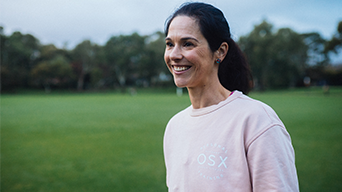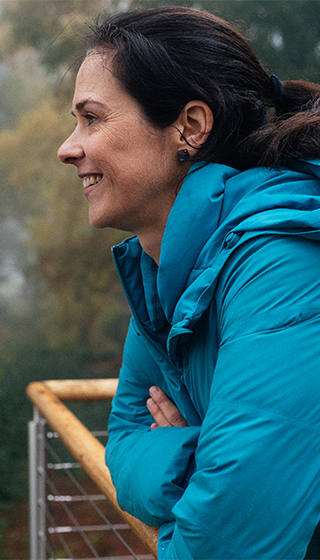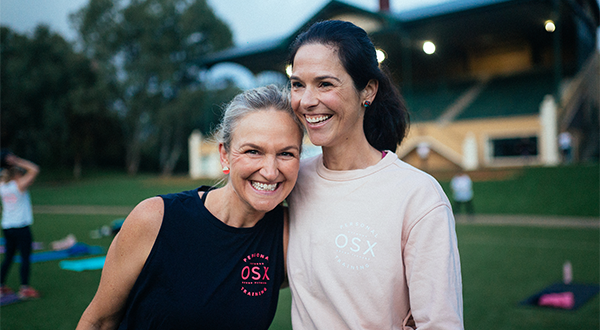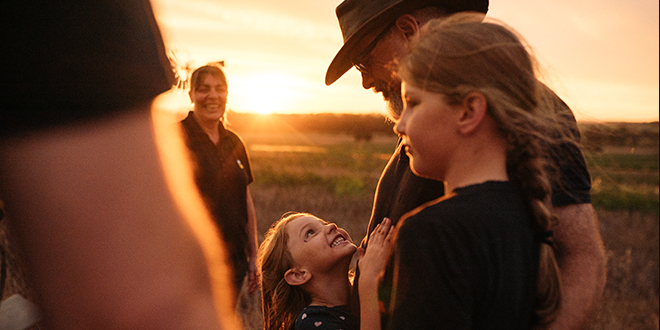Parenting, depression and coping with life – Georgie’s story
After a tough upbringing, Georgie wants to use her past experiences to create a safe environment for her family.
This story contains material some people may find distressing
“My childhood was punctuated by domestic violence.”
There’s a weight to these words as Georgie says them.
Growing up, she knew that her family was different. That there were things happening in her household that weren’t happening at her friends’ houses.
Georgie still carries that with her, which is why – now that she has two girls of her own – she talks about wanting to create an environment at home of safety and openness when it comes to mental health.
Growing up with domestic violence
“It was a very challenging environment for a child. It wasn't until I was much older that I really did realise that that wasn't what every family looked like.”
Georgie spent a lot of time trying to get out of the house. And hiding parts of herself, and her family. The parts that she knew didn’t match up with her friends’ experiences. She had carefully crafted a persona to show the outside world. She was, in her own words, a chameleon.
“I could make other people happy. Even if it wasn't making myself happy,” says Georgie.
“Looking back at it, it's damaging because I probably compromised myself and my values sometimes to make sure that I was always appeasing everyone else.”
Constantly trying to put on a brave face and please everyone else took its toll on Georgie. Masking her true feelings was hurting, and it got more and more difficult to control.
“You just get used to being a person that people like and people want to be around and portraying this happy go lucky image,” says Georgie.
She put a huge amount of pressure on herself. To make everything appear like it was ok. To make sure the ‘mask’ stayed on when she was out.
But no matter how hard she tried, something was always bubbling just below the surface.
The signs of depression
In her late teens, after speaking with her GP, Georgie was diagnosed with depression. The things she'd be feeling in her body all those years finally had a name to them.
“It's a lethargy that is like nothing I have experienced,” says Georgie.
“It just feels like everything wants to be sucked into the floor...like something absolutely terrible is going to happen and my brain is convinced that it's a real threat and it's just around the corner.”
These are feelings that Georgie still experiences. The sense of foreboding, the lethargy. But, with time and after learning what helps her, she is able to cope.
Coping strategies
“I find my depression coping strategies are quite instinctual and I just roll with them generally,” says Georgie. “Running for me is one.”
Georgie loves to run. And not just a few kilometres around the block. Georgie runs ultra marathons. And she admits part of that love comes from the pain that comes with running long distances.
The barrier she needs to push through. The thoughts she sits with. The endorphin release. All of it.
She also reflects on the importance of finding a safe space to ask for help.
Beyond Blue helped in the moments there was no one she could speak to right away.
Parenting with depression
When Georgie and her partner, Dan, started a family, Georgie was committed to making sure she created a mentally safe environment for her kids.
“I wanted to always have a household where it was ok to talk about mental health and it's ok to ask questions. I don't ever want my kids to feel like they can't talk to me,” says Georgie.
“It's okay to feel sad. It's okay to ask for help about what you're feeling, and for strategies to help you move through it.”
Those strategies might be getting outside, going for a walk, or sometimes knowing it’s ok to give yourself a break.
“I don't want them to ever feel the shame that I felt as I was growing up that, you know, depression was kind of taboo.”
Georgie knows that depression has shaped the way she does most things. As she continues to learn, she’s hoping that she continues to have a positive impact on those around her.
“If I can parent the way I do, or if I'm a friend the best way I can be, other people can learn. And be open. And talk about these things,” says Georgie.
Georgie’s experiences, both good and bad, have shaped the way she communicates with friends when she’s having a tough time. They’ve changed the way she manages overwhelming situations. And, most importantly for her, the way she parents.
For Georgie, the pain and the effort is always worth it. Whether it’s running an ultra-marathon, or working through difficult mental health challenges. They’re all opportunities for growth. For Georgie and for her family.
Photography by Good Grief Productions
If you are experiencing or have experienced domestic violence or depression, we encourage you to seek support from the following services:
- 1800 Respect: 1800 737 732
- Beyond Blue Support Service: 1300 224 636
- Lifeline: 13 11 14








